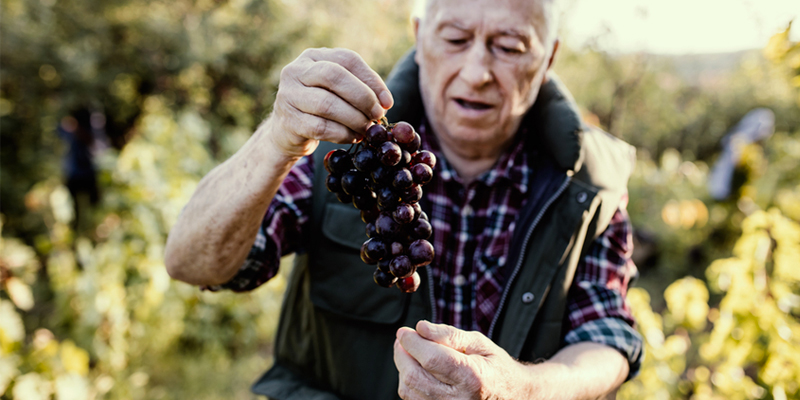Winemakers are the prom queens of the wine business. Generally, they deserve their tiaras and the spotlight — there really is a degree of magic in transforming a pile of grapes into delicious wine, after all. (Trust me, stomping grapes in your backyard won’t get the same results.)
But there’s another person in the winemaking equation who deserves more of that same spotlight, and maybe even a crown of his or her own: the wine growers who provide wineries with the raw materials — the grapes — essential to vinous bliss. It’s easy to get lost between the bottles and flashy marketing, but wine is an agricultural product.
Like the prom planning committee, devoted, hardworking farmers are essential to winemaking, but their role lies behind the shiny labels and pretty barrels that surround winemakers. From farmers who own and tend their own vines, to contracted managers who care for large swaths of vineyard land, these growers do an equal share of a season’s work, guiding the fruit of a grapevine into the perfect balance for award-winning and chuggable wines.
While a handful of winemakers also tend their own vineyards, the amount and scope of work it takes to get grapes wine-ready makes doing both jobs almost impossible. Contrary to popular belief, the job duties of growers and winemakers share few (if any) similarities, and both require a full year’s work.
The start and end of grape season may get all the attention, but it’s a labor of love for a full 12 months. From early March, when the slow and arduous process of pruning begins, grape growers are intently focused on the season ahead, watching for bud break (which determines the official start of the season) and repeatedly checking the weather in hopes that frost won’t threaten baby buds. Through flowering and fruit set, growers monitor growth and apply the organic or chemical sprays that protect grapes from mold or pesky insects — a process that’s done throughout the season to prevent damage. Leaf thinning, shoot positioning, canopy management and tests upon tests upon tests dominate the summer season. As you know if you’ve ever had a garden, nature doesn’t just take care of itself. In short, these guys and gals earn their farmers’ tans.
But spring and summer are the slow seasons in the winery, right? Wrong. Contrary to popular belief, winemakers don’t start jet-setting the moment grapes stop arriving at the winery, or even once fermentation is complete. After initial fermentation, most wines go through a closely monitored secondary fermentation that turns tart acids into the smooth, creamy acids that give wines a luxurious mouthfeel. Then, winemakers are continuously topping, blending and testing wines to make sure bad bacteria isn’t hiding anywhere. Before long, it’s time to fine, filter and bottle wines from previous vintages, or wines made in nouveau and rosé styles.
Even in seemingly “slow” seasons, growers stay busy fertilizing vineyards and monitoring rainfall, vineyard parallels to constantly topping up and tasting wine in the cellar.
These jobs require two different skill sets, and while the roles overlap, especially at the harvest hand-off of grapes, their key traits and critical skill sets are completely different and warrant separate college degrees. Growers are plant scientists — skilled in identifying vine diseases and threats — who know how to make vines thrive. Winemakers, on the other hand, are experts in fermentation science and the problems and glories that go along with turning sugar into alcohol. It could be the alcohol part that makes them everyone’s favorites, but growers perform equal magic in vineyards.
Together, the two roles form a happy, symbiotic partnership — the prom committee plans the dance so the queens can strut their stuff — keeping humanity supplied with great wine. Most winemakers and growers would agree that they need each other in the fields or cellar to produce viable volumes of wine, and usually wouldn’t trade places.
Next time you’re thanking the universe for a much-needed glass of wine (so, in an hour or maybe right now) remember it’s not all glitz and glamour. It’s farmers, too.

